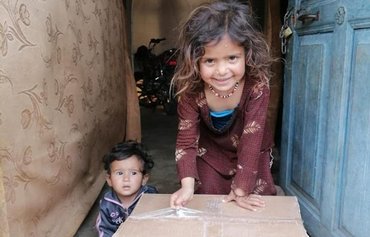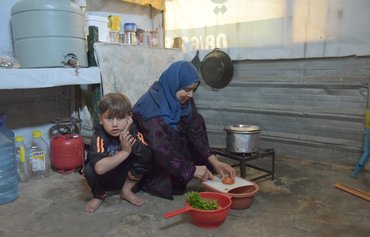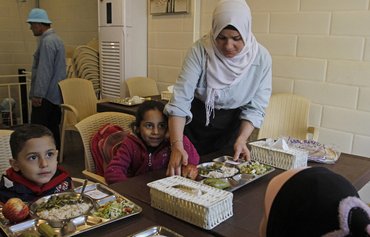BEIRUT -- Jamila Merheb, a mother of four, stood in front of shelves of grains and beans in a supermarket in Ashrafieh, calculating in her head the cost of a mujadara (lentils) dish at today's prices.
"Mujadara used to be the staple food of the poor and would cost no more than 8,000 LBP. Today, it is more than 100,000 LBP, not counting the cost of the salad" that typically accompanies the dish, she said.
"Poverty struck a blow to our core," Merheb said.
"My refrigerator and pantry cabinet are empty, as are the stomachs of my children."
![The economic collapse has driven many Lebanese to resort to begging for food, medicine and money. [Ziad Hatem]](/cnmi_am/images/2021/12/21/33069-leb_1-600_384.jpg)
The economic collapse has driven many Lebanese to resort to begging for food, medicine and money. [Ziad Hatem]
Vegetables and boiled potatoes now make up the bulk of meals for many impoverished Lebanese, with Merheb saying her family has not eaten meat or chicken for months.
To make matters worse, her husband has been unemployed for over a year, and she is unable to enrol her children in school because of cost.
"We did not expect the economic collapse to impact us to this extent," she said.
The economic collapse in Lebanon has cast a shadow over hundreds of thousands of families, turning them from underprivileged families to families living below the poverty line.
According to the World Bank, the poverty belt in Lebanon has expanded to include about 2.2 million residents, with the poor consisting of 1.5 million Lebanese and 780,000 Syrian refugees.
Cash assistance programmes
Most of the "new poor" depend on food rations provided by associations, local and international organisations, and churches.
The food aid typically includes grains such as rice, lentils and chickpeas and basic foodstuffs including milk, oil and canned cheese.
On December 1, following months of delays, Lebanon opened registration for two cash assistance programmes to help 700,000 vulnerable families cope with the withdrawal of crucial subsidies, despite a shortage in funding.
Registration for the initiatives will remain open until the end of January.
One of the programmes -- Aman, for which the World Bank has secured a $246 million loan -- will give 150,000 families $150 a month each and cover $200 in school costs for 87,000 secondary school students.
The implementation of the cash card programme "will be subject to intense oversight and scrutiny", said Saroj Kumar Jha, the World Bank's regional director.
The ration card programme, meanwhile, aims to provide up to $126 a month for eligible families. But the government has yet to determine the source of funding for the $556 million programme.
The Lebanese government had submitted a formal request to the World Bank for funding of the ration card programme, Jha said in an interview for the English edition of the local newspaper L'Orient-Le Jour.
Although Jha noted that the World Bank would be ready to consider the request, he said the Lebanese government should fund part of the programme from its own budget.
Citizen Youssef Saad, who awaits the start of the cash card programme, blamed the state and the parties that make up the government of "controlling our livelihood and impoverishing us".
Saad used to work in a factory before it had to close its doors in mid-2021 after the collapse of the financial and economic situation in the country.
"We have lost our human dignity, and it hurts my pride when a neighbour offers me a plate of grilled chicken from time to time," he said angrily.
Suffering in the Bekaa
Poverty and destitution have settled in all Lebanese homes in all regions, but the poverty rate is among the highest in the Bekaa, according to a charitable organisation official in the Bekaa, who preferred not to be named.
Villages in the Bekaa "suffer from health, economic and social poverty due to the economic collapse and the presence of parties in power that are impoverishing the country and its people with their political management", he said.
The control over the Bekaa wielded by the Shia duo of Hizbullah and the Amal movement has created three social classes, he said.
The first class consists of the parties' members "who are living in prosperity and luxury and deal in dollars", he said.
The second consists of their supporters who also benefit through their relatives who are members of the parties, and receive financial, economic and school tuition aid.
Meanwhile, the third class is non-partisan and consists of the poorest people, he said, noting that "the parties intimidate these people by threatening their livelihoods and businesses on the eve of elections".
He said the poorest segment of the population in the Bekaa "is facing a dire situation at the start of winter due to the high cost of fuel and firewood".
In response to this tragic situation, some religious institutions have been actively distributing food rations on a periodic and monthly basis, including the Armenian Catholic Patriarchate.
According to Archbishop George Asadorian, the Patriarchate has, since the onset of the crisis, taken it upon itself to help people of all sects fight the spectre of hunger.
"We started with 400 poor families and that figure has today grown to 1,200 families receiving monthly rations consisting of all kinds of grains, milk, cheese, meat and chicken through a food ration card," he told Al-Mashareq.
The Patriarchate is also helping those families get access to medical care, medicine, hospitalisation, and with rent allowances, he said.

![Hunger is ravaging a large segment of the Lebanese population, especially the elderly. This Lebanese man says he is content with a loaf of bread for sustenance. [Ziad Hatem]](/cnmi_am/images/2021/12/21/33162-leb2-600_384.jpg)
![A homeless woman sleeps at the entrance of a building in Jdeideh, Metn district. [Ziad Hatem]](/cnmi_am/images/2021/12/21/33163-leb_3-600_384.jpg)
![This man has been sleeping on a sidewalk in Lebanon's Dora district for months, after becoming unable to pay his rent, and now he scrounges for leftover food in the garbage. [Ziad Hatem]](/cnmi_am/images/2021/12/21/33164-leb_5-600_384.jpg)
![The Armenian Catholic Patriarchate has been supporting 1,200 families with monthly food rations. [Nohad Topalian]](/cnmi_am/images/2021/12/21/33165-leb_6-600_384.jpg)
![The Armenian Catholic Patriarchate distributes monthly food rations to many families to alleviate the impact of the economic crisis on them. It also dedicates two days a week to distribute ready-made meals. [Nohad Topalian]](/cnmi_am/images/2021/12/21/33166-leb_7-600_384.jpg)






